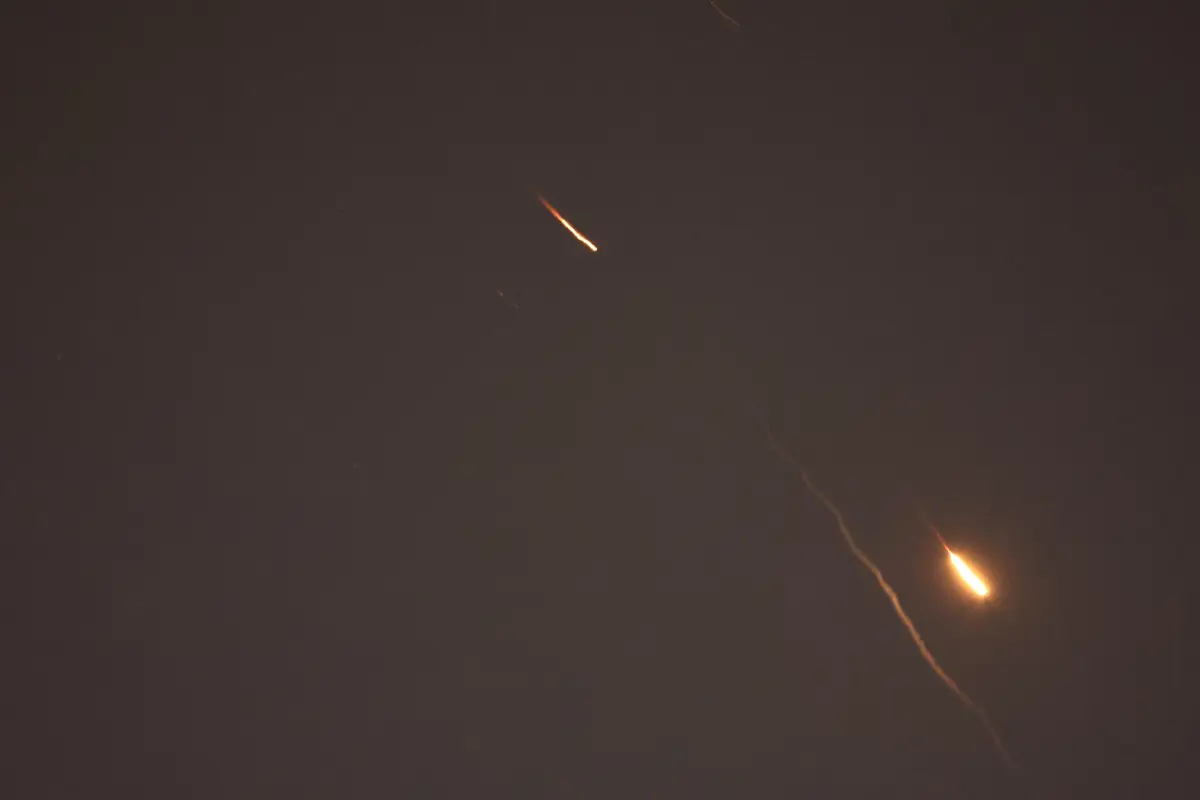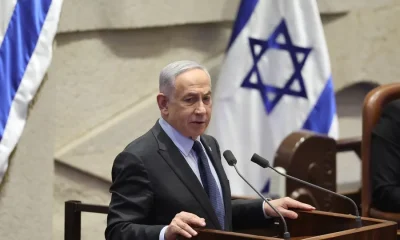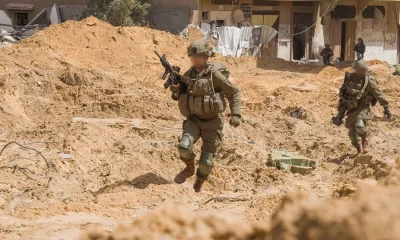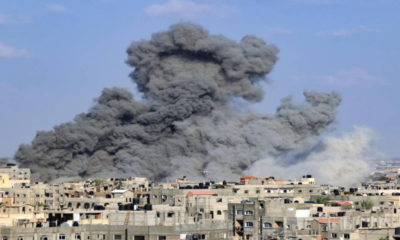International
Iran’s drones and missiles pass through the Middle East, where they monitor the growing tension

Lebanese anti-aircraft defenses launched several missiles over the skies of Beirut, presumably to respond to Iranian projectiles passing through their airspace on their way to Israel, public television TeleLiban reported.
“Interceptor missiles explode on the Airport Highway in Beirut,” the channel said, reporting that explosions could also be heard in several parts of the country, from the east to the south, possibly motivated by more responses from the air defenses.
Several missiles sailed the skies of the Lebanese capital about three hours after Tehran announced the start of its attack, according to EFE.
All this coincides with the passage through the region of a large number of missiles and drones launched by Iran towards Israel, in response to the bombing that two weeks ago destroyed its consulate in Damascus and killed seven members of the Revolutionary Guard, including two generals.
More than a hundred Iranian drones intercepted outside Israeli airspace by the United States and the United Kingdom.
Drones and cruise missiles launched by Iran against Israel have passed through Iraq’s airspace, while explosions were heard in the sky of some regions of the north of the country, local media and a security source reported to EFE on Sunday.
A source from the Iraq Area Force said on condition of anonymity that the projectiles crossed several areas of the country, after the Iraqi Civil Aviation Authority announced the closure of the airspace from 8:30 p.m. to 2:30 GMT on Sunday.
For their part, local media reported that several rounds of drones and missiles flew over the southern provinces of Maysan and Nasiriya, as well as that of Suleimaniya, in the semi-autonomous region of Iraqi Kurdistan, in northern Iraq.
Likewise, the Kurdish media Rudaw indicated that explosions were heard in the sky of Erbil, the capital of Iraqi Kurdistan, without it being known so far whether they are projectiles intercepted by the regional authorities or by the international coalition led by the United States, which is established in that locality.
The media also indicated that the sirens of the US consulate in Erbil began to sound after the projectiles flew over the locality, while he pointed out that the air defense systems of the building itself could have intercepted the unmanned aircraft.
Several areas of Syria recorded explosions this Sunday amid attempts by Israeli forces to shoot down the large number of drones and missiles launched by Iran into its territory, two organizations reported.
The Syrian Observatory of Human Rights confirmed in its X account that deflagrations could be heard not only in Damascus but also in areas of the country as disparate as the provinces of Homs (center), Hama (northwest) or Deraa (south).
The NGO, based in the United Kingdom and a wide network of collaborators on the ground, attributed the explosions to missiles launched by the Syrian anti-aircraft defenses against Israeli projectiles that, in turn, tried to shoot down those sent by Iran.
However, the Syrian authorities, allies of Tehran, have not yet confirmed that they have attacked Israeli targets on their territory.
The network of local activists from the south of the country ‘Horan Free Media’ also reported in X of the shooting down of several Iranian drones in the airspace of the province of Deraa and released a video in which you can see the moment when they were intercepted in the middle of the night.
Several drones launched from Iran intercepted in the sky of Amman, the capital of Jordan, according to state television Al Mamlaka in a live broadcast, during which the anti-aircraft sirens could be heard.
The Jordanian Armed Forces intercepted drones in the capital’s airspace, the television said.
The unmanned aircraft were also seen, and destroyed, in the sky of the Gerasa region, in northern Jordan, according to EFE.
International
U.S. Senate Rejects Budget, Bringing Government Closer to Shutdown Amid DHS Dispute

The U.S. Senate voted on Thursday against a budget proposal in a move aimed at pressuring changes at the Department of Homeland Security (DHS), following the killing of two civilians during a deployment of immigration agents in Minneapolis.
All Senate Democrats and seven Republican lawmakers voted against the bill, which requires 60 votes to advance, pushing the country closer to a partial government shutdown that would cut funding for several agencies, including the Pentagon and the Department of Health.
The rejection came as Senate leaders and the White House continue negotiations on a separate funding package for DHS that would allow reforms to the agency. Proposed measures include banning Immigration and Customs Enforcement (ICE) agents from wearing face coverings and requiring them to use body-worn cameras during operations.
The vote took place just hours after President Donald Trump said he was “close” to reaching an agreement with Democrats and did not believe the federal government would face another shutdown, following last year’s record stoppage.
“I don’t think the Democrats want a shutdown either, so we’ll work in a bipartisan way to avoid it. Hopefully, there will be no government shutdown. We’re working on that right now,” Trump said during a Cabinet meeting at the White House.
International
Trump Says Putin Agreed to One-Week Halt in Attacks on Ukraine Amid Extreme Cold

U.S. President Donald Trump said on Thursday that he secured a commitment from Russian President Vladimir Putinto halt attacks against Ukraine for one week, citing extreme weather conditions affecting the region.
“Because of the extreme cold (…) I personally asked Putin not to attack Kyiv or other cities and towns for a week. And he agreed. He was very pleasant,” Trump said during a Cabinet meeting broadcast by the White House.
Trump acknowledged that several advisers had questioned the decision to make the call.
“A lot of people told me not to waste the call because they wouldn’t agree. And he accepted. And we’re very happy they did, because they don’t need missiles hitting their towns and cities,” the president said.
According to Trump, Ukrainian authorities reacted with surprise to the announcement but welcomed the possibility of a temporary ceasefire.
“It’s extraordinarily cold, record cold (…) They say they’ve never experienced cold like this,” he added.
Ukrainian President Volodymyr Zelensky later commented on the announcement, expressing hope that the agreement would be honored.
International
Storm Kristin Kills Five in Portugal, Leaves Nearly 500,000 Without Power

Storm Kristin, which battered Portugal with heavy rain and strong winds early Wednesday, has left at least five people dead, while nearly half a million residents remained without electricity as of Thursday, according to updated figures from authorities.
The revised death toll was confirmed to AFP by a spokesperson for the National Emergency and Civil Protection Authority (ANPEC). On Wednesday, the agency had reported four fatalities.
Meanwhile, E-Redes, the country’s electricity distribution network operator, said that around 450,000 customers were still without power, particularly in central Portugal.
Emergency services responded to approximately 1,500 incidents between midnight and 8:00 a.m. local time on Wednesday, as the storm caused widespread disruptions.
The Portuguese government described Kristin as an “extreme weather event” that inflicted significant damage across several regions of the country. At the height of the storm, as many as 850,000 households and institutions lost electricity during the early hours of Wednesday.
Several municipalities ordered the closure of schools, many of which remained shut on Thursday due to ongoing adverse conditions.
Ricardo Costa, regional deputy commander of the Leiria Fire Brigade, said residents continue to seek assistance as rainfall persists.
“Even though the rain is not extremely intense, it is causing extensive damage to homes,” he noted.
In Figueira da Foz, a coastal city in central Portugal, strong winds toppled a giant Ferris wheel, underscoring the severity of the storm.
-

 Central America3 days ago
Central America3 days agoGuatemala seizes over a ton of cocaine hidden in flour at Pacific port
-

 International4 days ago
International4 days agoDelcy Rodríguez seeks political agreements after Maduro’s ouster
-

 International3 days ago
International3 days agoHistoric snowstorm paralyzes Toronto after 60 centimeters of snow
-

 International3 days ago
International3 days agoSpain’s irregular migrant population rises to 840,000, study finds
-

 Central America2 days ago
Central America2 days agoGuatemala Police Arrest Prison Guard Caught in the Act of Extortion
-

 Central America2 days ago
Central America2 days agoHonduras swears in conservative president Asfura after disputed election
-

 International4 days ago
International4 days agoFederal immigration agents kill man in Minneapolis, sparking protests and outrage
-

 International1 day ago
International1 day agoFootball Fan Killed in Clashes After Colombian League Match
-

 Central America2 days ago
Central America2 days agoBukele leads public trust rankings as UCA survey highlights gains in security
-

 International2 days ago
International2 days agoWinter Storm Fern Leaves 30 Dead and Over One Million Without Power Across the U.S.
-

 International2 days ago
International2 days agoDoomsday clock moves to 85 seconds before midnight amid rising global risks
-

 Sin categoría2 days ago
Sin categoría2 days agoEight Killed in Series of Armed Attacks in Ecuador’s Manabí Province
-

 International3 days ago
International3 days agoRights group says nearly 6,000 killed in Iran protest crackdown
-

 International1 day ago
International1 day agoMissing Spanish Sailor Rescued After 11 Days Adrift in Mediterranean
-

 International1 day ago
International1 day agoRubio Says U.S. Could Participate in Follow-Up Russia-Ukraine Talks
-

 Central America1 day ago
Central America1 day agoGuatemala President Says Starlink Terminal Found Inside Prison
-

 International2 days ago
International2 days agoSpain approves plan to regularize up to 500,000 migrants in Historic Shift
-

 Sin categoría2 days ago
Sin categoría2 days agoEl Salvador Launches Fourth Year of Ocean Mission to Protect Marine Ecosystems
-

 International3 days ago
International3 days agoVenezuela frees at least 80 political prisoners, NGO says
-

 International3 days ago
International3 days agoEU launches new probe into X over AI-generated fake nude images
-

 International3 days ago
International3 days agoSevere winter storm grips U.S., leaves multiple dead as extreme cold persists
-

 International3 days ago
International3 days agoFrance debates ban on social media for children under 15
-

 International3 hours ago
International3 hours agoU.S. Senate Rejects Budget, Bringing Government Closer to Shutdown Amid DHS Dispute
-

 International3 hours ago
International3 hours agoMan Arrested After Vehicle Crashes Into Jewish Institution in Brooklyn
-

 International3 hours ago
International3 hours agoStorm Kristin Kills Five in Portugal, Leaves Nearly 500,000 Without Power
-

 International3 hours ago
International3 hours agoTrump Says Putin Agreed to One-Week Halt in Attacks on Ukraine Amid Extreme Cold


































